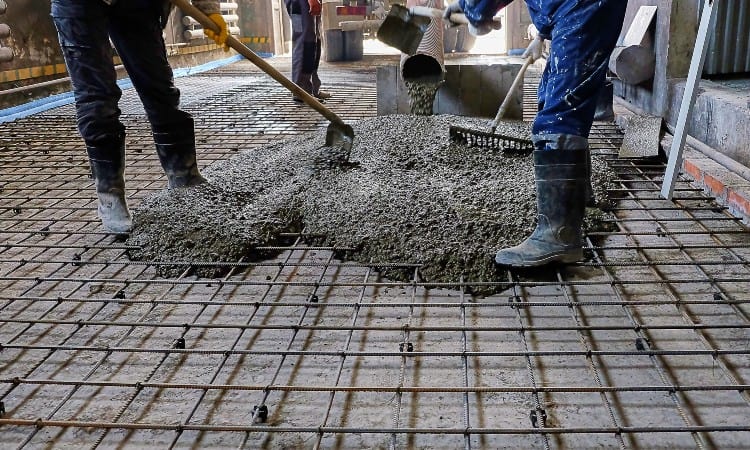Uneven warehouse flooring poses significant health and safety risks. Bumpy spots or cracks may damage pallet jacks or other equipment while depressions accumulate dirt and moisture.
Durability
Uneven warehouse floors require personnel to walk around damaged areas, reducing efficiency and increasing safety risks. Concrete provides superior durability that helps warehouse operations run smoothly.
Reinforced concrete sets up and hardens around steel bars, increasing its strength and resisting damage. This combination of tensile and compressive strength makes concrete an excellent material choice for warehouse floors.
Design of concrete floors must be performed by an engineer with expertise, who must perform calculations regarding fire and load calculations, concrete reinforcement requirements and concrete slabs Melbourne thickness.

Steel and concrete react similarly to temperature changes, preventing weakening in concrete structures.
Concrete is an economical building material with multiple advantages that is widely available and easy to install, making it one of the more accessible building options available today. Plus, its aesthetic qualities can be further enhanced using various coloring and etching techniques that create stunning floors with superior durability that are protected with penetrating sealant to prevent staining or water damage to keep looking their best for years.
Resistance to Corrosion
Reinforced concrete floors, however, are more resistant to damage caused by daily wear and tear and can withstand intense pressure better than most materials, meaning costly repairs won’t be required as often.
Reinforced concrete’s strength and durability stem from its combination of tensile and compressive strengths as well as steel rods or mesh that it is built around. Both components react similarly to temperature changes, meaning that reinforced concrete won’t crack under pressure.
Imperfections and depressions in warehouse floors can trap dirt, moisture, mildew and rodents that pose health and safety risks to employees. A consistent surface made of reinforced concrete can help you address these concerns as well as save money on cleaning services and pest control fees.
Abrasion Resistance
Concrete floors can often endure intense levels of wear. This is especially the case in industrial and warehouse settings where heavy forklift truck traffic, carts and pallets must pass over them.
Abrasion resistance is an integral aspect of industrial and commercial warehouse flooring. Lack of it poses serious safety risks in these environments due to surface wear-related incidents that lead to trips and falls.
Factors which impact the abrasion resistance of concrete include its water/cement ratio, slump value, aggregate grade and air content. Mineral additives like polymer or basalt fibres may also increase its resistance; however using higher cement content to increase resistance could result in shrinkage issues on floors.
Slip Resistance
Slip resistance is key in helping prevent slips, trips and falls in all environments. Slip resistance depends on several factors including finish, use texture cleaning method program as well as environmental conditions.
Reinforcing concrete floors provides high levels of slip resistance by creating a rough surface that increases friction, something which can be enhanced via brooming when the concrete is still fresh but unset. This surface texture is especially effective when pedestrian traffic travels perpendicular to its grain direction.
Uneven warehouse floors present a health and safety risk as their bumps and depressions may collect dirt, moisture or rodents. Reinforced concrete flooring makes cleaning simple while being resilient enough to withstand the weight of heavy vehicles and equipment.
Safety
Uneven floors can create trip hazards, increasing the risk of injury for staff and visitors. Furthermore, uneven areas collect dirt and moisture, encouraging mildew, mold and rodent growth which leads to reduced warehouse efficiency and higher maintenance costs.
Concrete reinforced floors harden over steel bars to form an extremely resilient material that can endure immense pressure and tension, which makes it especially suitable for industrial settings where forklifts regularly move over their surfaces. Furthermore, its ability to withstand heat fluctuations and environmental changes makes concrete flooring a popular choice in warehouses and other commercial settings; its low rate of heat transfer also renders it highly resistant to fire risk.